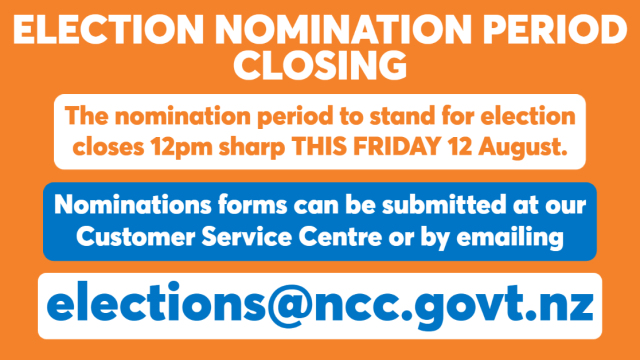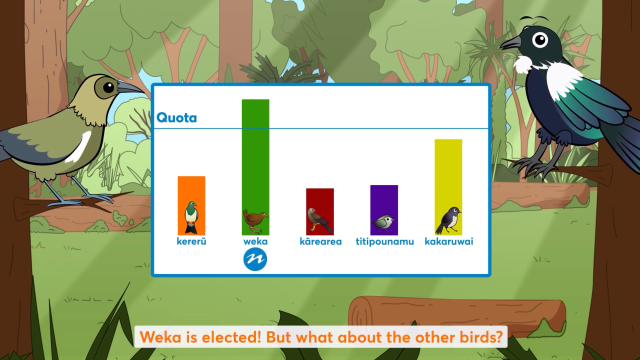What do you stand for? How to run in the local elections
05/05/2022 10:52am
Have you ever thought about running for Council, or even Mayor, but been unsure where to start?
Nominations to stand for election open on Friday 15 July 2022 and close at 12 noon on Friday 12 August 2022. If you are considering running, now is the time to ensure you fully understand the election process and what the role of an elected representative includes.
To provide some inspiration, we interviewed three former Nelson City councillors - Ali Boswijk, Hilary Mitchell and Gail Collingwood - about their experiences working in local government. Whether they wanted to create a better relationship between Council and members of the community, advocate for cultural and arts projects, or simply felt it would be a natural progression of their knowledge and skills, they each had their own unique reasons for standing.
To watch the videos, visit: shape.nelson.govt.nz/local-elections-2022.
Local elections take place this October, and we encourage everyone to consider what you would stand for. Do you see changes that could be made to improve our city? Could you be a voice for underrepresented members of the community? Do you have knowledge or skills that could help guide Nelson through decisions both big and small?
To help those considering standing for election this year, we’ve put together a list of frequently asked questions.
When is election day?
Election Day is Saturday 8 October 2022. Voting closes at midday on that day, but people can cast their votes as soon as they receive their voting papers in the post.
How many positions are there to fill?
There will be 13 positions to fill – 12 councillors and one Mayor. Three councillors and the Mayor will be elected at large (by the whole city); four councillors will be elected from the Central Ward; four elected from the Stoke-Tāhunanui Ward; and one elected from the Whakatū Māori Ward.
What is the role of a councillor?
Councillors represent the needs and views of the community within a legislative and regulatory framework. They participate in strategic and long-term planning for the entire Nelson district; participate in setting a budget and rates; develop policy across a wide range of activities and services; review and develop bylaws for the city; and monitor the performance of the Council organisation and the Chief Executive.
They also represent the city at functions; coordinate and form partnerships with other spheres of government and other agencies; and advocate on a wide range of issues, from climate change and housing needs to sport and recreation and modes of transport.
What qualifications and experiences do I need to be a candidate?
You do not need any formal qualifications to serve as a councillor or Mayor. Elected members come from all walks of life and generally have a strong desire to serve their community.
You must, however, be a New Zealand citizen, be enrolled as a parliamentary elector anywhere in New Zealand, and be nominated by two electors in the area or ward you are standing for.
Other requirements exist for current employees of Council, people with concerns or interests in contracts over $25,000 with Council, or those subject to a Court Order.
How many people do I need to nominate me? Who is able to nominate me?
You need two people on the electoral roll for the area you are standing in to nominate you. If you are standing for election for one of the three wards (Central, Stoke-Tāhunanui or Whakatū Māori), your nominations must come from two people on the electoral roll for the same ward.
When do nominations open?
Nominations open Friday 15 July 2022 and close at 12 noon on Friday 12 August 2022.
Where do I get a nomination form?
Nomination forms will be available from Council’s website and Customer Service Centre from 15 July until 12 August at midday.
Do I need to be on the Māori electoral roll or of Māori descent if I am standing for election in the Māori Ward?
No. To be eligible you must be a New Zealand citizen and your name must be on the Parliamentary Electoral Roll (anywhere in New Zealand).
You will need to be nominated by two electors whose names appear on the Māori electoral roll within the area of election for which you are standing.
Equally, if you are on the Māori electoral roll, you can stand in a general ward and will need to be nominated by two electors whose names appear on the general electoral roll within the area of election for which you are standing.
How long is the term of an elected member?
Three years.
How much will I get paid?
Pay and allowances are determined by the Government’s Remuneration Authority. You can find info on remuneration for Nelson City Council at this link: bit.ly/3KdEVMv.




